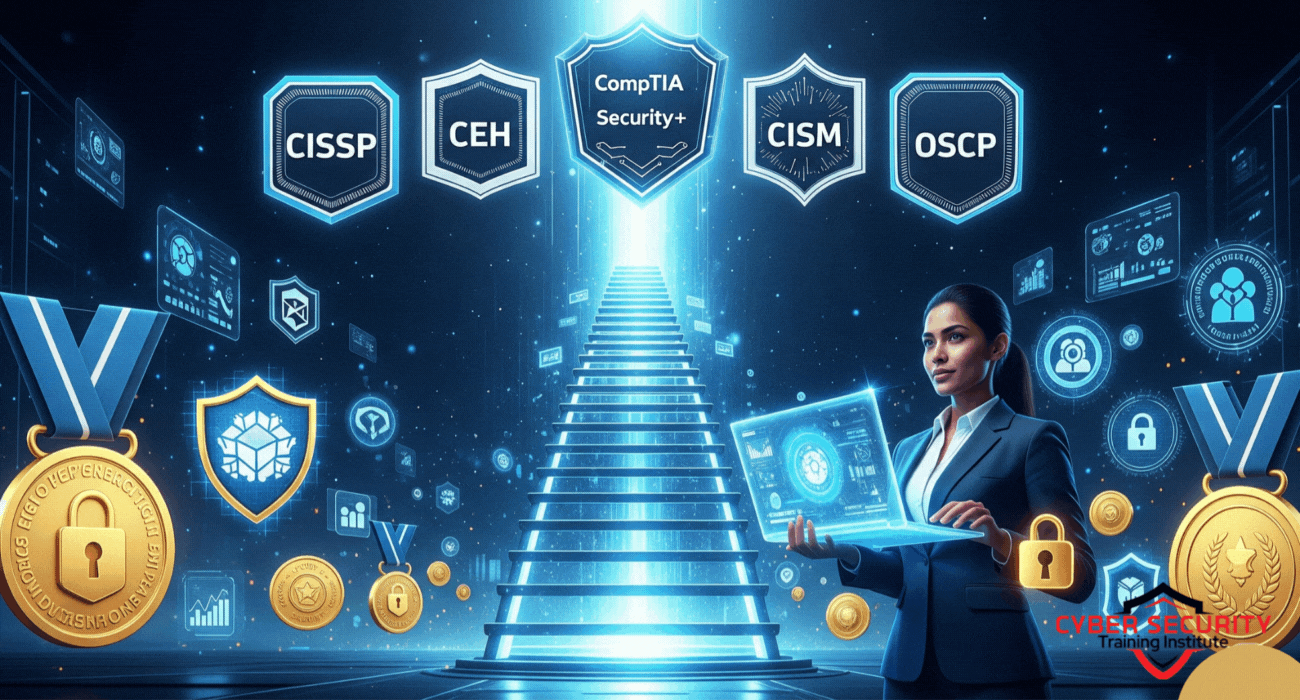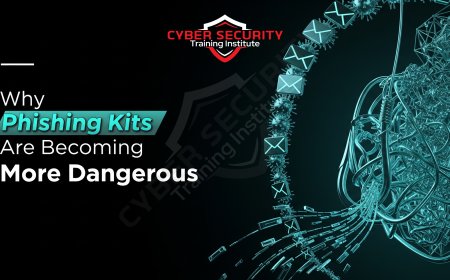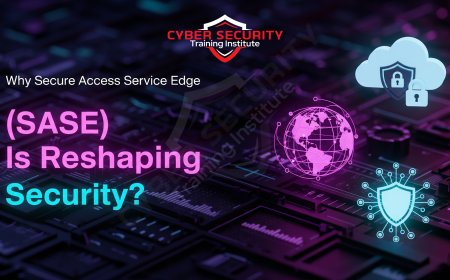Top 5 Certifications to Boost Your Cybersecurity Career
In a world where digital attacks can cripple billion-dollar companies overnight, the demand for cybersecurity professionals is skyrocketing. But with competition rising just as fast, how do you stand out? The answer: certifications. Whether you're a student stepping into the cyber world or a professional aiming for the next big leap, the right certification can be your career game-changer. It proves your skills, increases your visibility, and tells employers you're serious about defending the digital frontier. In this blog, we’ll uncover the top five cybersecurity certifications that not only sharpen your expertise but also unlock new job opportunities. Designed for both beginners and experienced professionals, this guide will help you find the certification that matches your goals and future-proof your career in cybersecurity.

Table of Contents
- CompTIA Security+
- Certified Ethical Hacker (CEH)
- Certified Information Systems Security Professional (CISSP)
- Cisco Certified CyberOps Associate
- Certified Information Security Manager (CISM)
- Comparison Table of Certifications
- Conclusion
- Frequently Asked Questions
CompTIA Security+
The CompTIA Security+ certification is a fantastic starting point for anyone entering the cybersecurity field. It’s widely recognized as an entry-level certification that covers the basics of cybersecurity, making it ideal for beginners. Security+ focuses on foundational skills like network security, risk management, and cryptography. It’s vendor-neutral, meaning it’s not tied to a specific technology, so you can apply the knowledge across various systems.
Why Choose Security+?
- It’s globally recognized and respected by employers.
- Covers essential topics like threat detection and incident response.
- Meets the requirements for many entry-level cybersecurity roles.
- Prepares you for more advanced certifications.
Who Should Take It? Beginners or IT professionals transitioning to cybersecurity, such as helpdesk technicians or network administrators.
How to Prepare: CompTIA offers study guides, online courses, and practice exams. Expect to spend 2–3 months preparing if you’re new to the field.
Certified Ethical Hacker (CEH)
The Certified Ethical Hacker (CEH) certification, offered by EC-Council, teaches you to think like a hacker—but for good. Ethical hackers, also known as penetration testers, identify vulnerabilities in systems before malicious hackers can exploit them. CEH covers techniques like hacking networks, web applications, and even social engineering (tricking people into revealing sensitive information).
Why Choose CEH?
- Teaches hands-on skills for testing system security.
- Highly valued for roles like penetration tester or security analyst.
- Focuses on real-world hacking tools and techniques.
- Enhances your ability to protect organizations from cyber threats.
Who Should Take It? Professionals with some IT experience who want to specialize in penetration testing or ethical hacking.
How to Prepare: EC-Council provides training courses, and there are many online platforms with CEH practice labs. Plan for 3–6 months of study, depending on your background.
Certified Information Systems Security Professional (CISSP)
The CISSP, offered by (ISC)², is considered the gold standard for cybersecurity professionals. It’s designed for experienced professionals and covers eight domains, including security architecture, risk management, and identity access management. CISSP is ideal for those aiming for leadership roles, such as security manager or chief information security officer (CISO).
Why Choose CISSP?
- Globally recognized as a mark of expertise.
- Opens doors to high-level cybersecurity positions.
- Covers a broad range of advanced cybersecurity topics.
- Requires five years of experience, ensuring credibility.
Who Should Take It? Seasoned professionals with at least five years of cybersecurity experience who want to move into management.
How to Prepare: (ISC)² offers official study materials, and boot camps are popular for intensive preparation. Expect 4–6 months of dedicated study.
Cisco Certified CyberOps Associate
The Cisco Certified CyberOps Associate certification focuses on security operations, teaching you how to monitor, detect, and respond to cyber threats. It’s perfect for those interested in working in a Security Operations Center (SOC), where teams analyze and respond to incidents in real time. The certification emphasizes Cisco’s security tools but also covers general cybersecurity principles.
Why Choose CyberOps Associate?
- Ideal for SOC analyst or incident response roles.
- Teaches practical skills for monitoring and analyzing threats.
- Aligns with Cisco’s widely used security technologies.
- Suitable for those with some networking knowledge.
Who Should Take It? IT professionals with networking experience or those aiming for SOC roles.
How to Prepare: Cisco offers training courses, and hands-on labs are crucial for understanding SOC workflows. Study time varies but typically takes 2–4 months.
Certified Information Security Manager (CISM)
Offered by ISACA, the Certified Information Security Manager (CISM) certification focuses on managing and governing an organization’s cybersecurity program. It’s designed for professionals who want to oversee security strategies, policies, and compliance rather than focusing solely on technical skills.
Why Choose CISM?
- Focuses on management and strategy, not just technical skills.
- Ideal for leadership roles like security manager or consultant.
- Recognized globally for its emphasis on governance.
- Enhances skills in risk management and compliance.
Who Should Take It? Professionals with 3–5 years of experience who want to move into cybersecurity management.
How to Prepare: ISACA provides study resources, and online courses are available. Expect 3–5 months of preparation, depending on your experience.
Comparison Table of Certifications
| Certification | Level | Experience Required | Best For | Cost (Approx.) |
|---|---|---|---|---|
| CompTIA Security+ | Entry-Level | None | Beginners, IT professionals transitioning | $400 |
| Certified Ethical Hacker (CEH) | Intermediate | 2 years recommended | Penetration testers, security analysts | $1,200 |
| CISSP | Advanced | 5 years | Security managers, CISOs | $750 |
| Cisco CyberOps Associate | Entry/Intermediate | 1–2 years recommended | SOC analysts, incident responders | $400 |
| CISM | Advanced | 3–5 years | Security managers, consultants | $760 |
Conclusion
Cybersecurity is a dynamic and rewarding field, and earning the right certifications can significantly boost your career. Whether you’re starting with the beginner-friendly CompTIA Security+ or aiming for advanced credentials like CISSP or CISM, each certification offers unique benefits tailored to different career paths. The CEH is perfect for those who love hands-on technical work, while the Cisco CyberOps Associate is great for SOC roles. By investing in these certifications, you’re not only enhancing your skills but also positioning yourself as a valuable asset in the fight against cyber threats. Choose the certification that aligns with your goals, dedicate time to preparation, and take the next step toward a successful cybersecurity career.
Frequently Asked Questions
What is the best cybersecurity certification for beginners?
CompTIA Security+ is the best starting point for beginners due to its comprehensive coverage of foundational cybersecurity concepts and lack of experience requirements.
Do I need a degree to get these certifications?
No, a degree is not required for any of these certifications, though some, like CISSP and CISM, require professional experience.
How long does it take to prepare for Security+?
With no prior experience, expect 2–3 months of study. Those with IT knowledge may need less time.
Is CEH worth it for ethical hacking?
Yes, CEH is highly valued for roles involving penetration testing and ethical hacking, offering practical skills in identifying vulnerabilities.
What experience is needed for CISSP?
CISSP requires five years of paid work experience in at least two of its eight domains, such as security operations or risk management.
Can I take Cisco CyberOps without networking experience?
While possible, having some networking knowledge (e.g., CompTIA Network+) makes it easier to understand CyberOps concepts.
Is CISM only for managers?
CISM is designed for those managing cybersecurity programs, but it’s also valuable for consultants or professionals aiming for leadership roles.
How much does a cybersecurity certification cost?
Costs vary: Security+ is around $400, CEH is about $1,200, CISSP is $750, CyberOps is $400, and CISM is $760.
Are these certifications recognized globally?
Yes, all five certifications are widely recognized and respected by employers worldwide.
Can I get a job with just Security+?
Yes, Security+ qualifies you for entry-level roles like security analyst or junior administrator, especially in government jobs.
How often do I need to renew these certifications?
Security+ and CISSP require renewal every three years. CEH, CyberOps, and CISM also have renewal requirements, typically every three years, with continuing education credits.
Is CEH hands-on or theoretical?
CEH includes both theoretical knowledge and hands-on skills, with a focus on practical hacking techniques.
What’s the difference between CISSP and CISM?
CISSP covers technical and managerial aspects across eight domains, while CISM focuses on management, governance, and strategy.
Can I take these exams online?
Yes, most of these certifications (e.g., Security+, CISSP, CISM) offer online proctored exams, though CEH may require in-person testing in some cases.
Do I need to know coding for these certifications?
Coding is not required, but basic scripting knowledge can help with CEH and CyberOps for tasks like automation or analyzing logs.
Which certification is best for a SOC analyst role?
Cisco CyberOps Associate is specifically designed for SOC analysts, focusing on monitoring and incident response.
Are there free resources to prepare for these certifications?
Yes, free resources like YouTube tutorials, vendor blogs, and trial courses are available, though official study materials are recommended.
Can I get certified without a job in cybersecurity?
Yes, you can earn certifications like Security+ or CEH without a cybersecurity job, but CISSP and CISM require professional experience.
How do I choose the right certification?
Consider your experience level, career goals (technical vs. managerial), and job requirements in your desired role.
Are these certifications enough to get a cybersecurity job?
Certifications help, but combining them with practical experience, networking, and soft skills increases your chances of landing a job.
What's Your Reaction?
 Like
0
Like
0
 Dislike
0
Dislike
0
 Love
0
Love
0
 Funny
0
Funny
0
 Angry
0
Angry
0
 Sad
0
Sad
0
 Wow
0
Wow
0










![How to Install RHEL 10 on VMware/VirtualBox [Tutorial]](https://www.cybersecurityinstitute.in/blog/uploads/images/202509/image_430x256_68b56dc967a4a.jpg)





